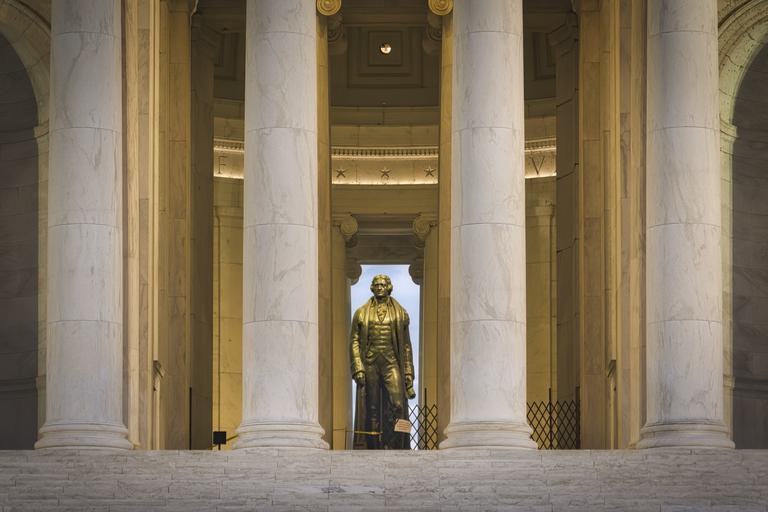
Law & Principles
J. Mark Ousley | March 26, 2021
In defense of ‘a shrine to freedom’
J. Mark Ousley
For a short time in my early teens, I lived on (Thomas) Jefferson Street and went to Thomas Jefferson Middle School, all while living in (Thomas) Jefferson City, Missouri.
Combine that geography with a deep interest in U.S. presidential history, mix in a minor talent for music, then fast forward 20 years and you get to me on May 25, 2020, pursuing a doctorate in music at the University of Oklahoma and writing a dissertation on a World War II-era choral work based on text written by Thomas Jefferson: “The Testament of Freedom,” by composer Randall Thompson.
After the national shock of the George Floyd incident, calls to remove statues of Jefferson and other Founding Fathers grew to a fever pitch, leading to mob removal of Jefferson, Lincoln, and Washington statues from sites all over the country. Needless to say, I was faced with a difficult choice: protect myself and my career, or stay the course and defend the historical merit of my work.
Almost immediately—and perhaps foolishly—I chose the latter.
Having made my decision, I began to research the arguments of those attacking Jefferson. What I found was simultaneously familiar and unsettling.
On July 6, 2020, The New York Times published an op-ed headlined “I’m a Direct Descendant of Thomas Jefferson. Take Down His Memorial.” The author, Lucian K. Truscott IV, a journalist and descendant of Jefferson, argues that Monticello is the more fitting monument to his slave-owning ancestor, and on that basis, advocates for the removal of the Jefferson Memorial. But conspicuously, Truscott embeds his argument in a rhetorical strawman. He wrote in his New York Times piece: "Described by the National Park Service as 'a shrine to freedom,' it is anything but." But in doing so he was contradicting a source with far more authority on the intent of the "shrine to freedom" than a generic script written by the National Park Service.
The Jefferson Memorial was dedicated in the middle of World War II—on April 13, 1943, the 200th anniversary of the birth of Jefferson, by the one man who, above all others, had the mandate to speak for the greatest generation who built it, President Franklin D. Roosevelt. (That same day, “The Testament of Freedom” was premiered at the University of Virginia.)
“Today, in the midst of a great war for freedom, we dedicate a shrine to freedom,” Roosevelt declared.
In his speech, FDR clearly provides the anti-fascist intent behind the Jefferson Memorial. FDR and the greatest generation saw that the first line of fascistic attack on German society was via censorship of “offensive” history and culture. That is why, during a time of war rationing, FDR made sure this “shrine to freedom,” which was obviously offensive to Nazi fascism, was built and dedicated.
Those advocating the removal of Jefferson memorials today are all too eager to claim the moniker of “anti-fascist.” But any good-faith examination of the record refutes their self-endowed moral position.
How can a movement claim to be “anti-fascist” or “anti-racist” and at the same time call for the removal of symbols raised explicitly in defiance of the historic embodiment of institutional fascism and racism?
I have been warned by wise, well-intentioned mentors and colleagues that making this case for an intent-focused analysis of the musical monument “The Testament of Freedom” is tantamount to career suicide. But I am reminded of the sacrifices of blood and treasure made by members of the greatest generation, which included black Americans, Hispanic Americans, Native Americans, Asian-Americans, and white Americans—in short, Americans—and I think to myself: if they had the courage literally to die on the hill of those anti-fascist Jeffersonian ideals, what right do I have to abandon it?
I also think of the great historian of liberty, J. Rufus Fears, who so admired the Founders, as we are reminded in OCPA’s J. Rufus Fears Fellowship program.
In the words of the profoundly flawed yet heroic Thomas Jefferson, set to music by the composer Randall Thompson: “The God who gave us life gave us liberty at the same time. The hand of force may destroy but cannot disjoin them."
“I shall not die without hope that life and liberty are on steady advance ... ”
J. Mark Ousley
J. Mark Ousley is a doctoral candidate in choral conducting at the University of Oklahoma and a graduate of OCPA’s J. Rufus Fears Fellowship program.